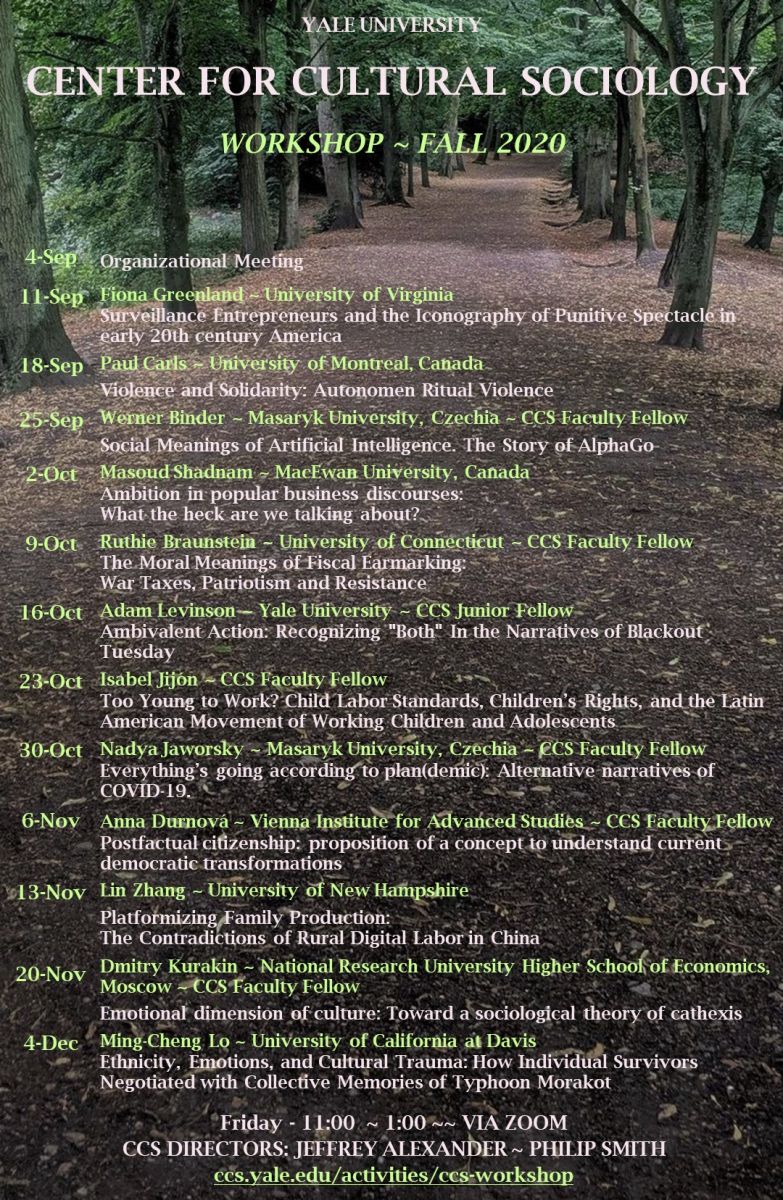|
|
|
University of Virginia
|
|
University of Montreal, Canada
|
|
Masaryk University ~ Czechia ~ CCS Faculty Fellow
|
|
MacEwan University, Canada
Abstract: The term ambition and its derivatives, such as ambitions, ambitious, and unambitious, constitute a commonly-used set of signifiers in popular business discourses. Despite this wide currency, management researchers have yet to interrogate the concept of ambition and explore the various ways that it figures in business discourses. In this project, we take an interpretive, grounded theory approach to bring to light the intricate meanings and workings of ambition in three top-ranked practitioner-oriented business journals from 2010 to 2019. Our preliminary findings reveal that ambition is positioned within four different constellations of meaning. We identify and outline the salient features of these four constellations in order to show how ambition is understood in different communicative contexts and connected with different regimes of managerial prescription.
|
|
University of Connecticut ~ CCS Faculty Fellow
Abstract: This paper argues that Americans’ association of taxpaying with both patriotism and resistance rests on public efforts to imbue certain uses of tax dollars with (positive or negative) moral significance. Drawing on the case of debates about war taxes and the insights of the new fiscal sociology and relational economic sociology – specifically Zelizer’s concept of “earmarking” – it argues that “fiscal earmarking” is central to such efforts. The paper makes this case, first, by developing the concept of fiscal earmarking, and distinguishing structural from symbolic fiscal earmarking. It then discusses three features of fiscal policy that reduce the public’s ability to evaluate the moral stakes of public spending – unmarking, obfuscation, and invisibility – and how earmarking enhances this ability. Finally, it uses the history of contentious debates over war taxes in the United States in order to show how groups both celebrating and resisting the use of tax dollars to fund war have symbolically earmarked war taxes in order to galvanize public support for their cause. The paper concludes by demonstrating how attention to fiscal earmarking illuminates other moral debates about the proper use of tax dollars, and advances our general understanding of tax politics and the moral meaning of money.
|
|
Yale University ~ CCS Junior Fellow
Abstract: Theories of behavior, choice, and action have long presented an “act” as kind of bottleneck of meaning-making, where action is either a cocktail of partial preferences or the survival of one over the rest. We argue that action is often something very (if subtly) different, and propose “ambivalent action” as a category of moral action defined by the actor’s conflicting intentions, in which the conflict is reified (not resolved) by the act/choice. We explore this duality through the case study of #BlackoutTuesday, a social media movement connected with global protests against police brutality and racism. The “black square” that characterized the movement, we argue, is best understood as an act of two-fold narrative-making: “both” silence and speech. The “success” of an ambivalent action in remaining in two narratives at once is determined by the audience.
|
|
CCS Faculty Fellow
|
|
Masaryk University ~ Czechia ~ CCS Faculty Fellow
|
|
Institute for Advanced Studies, Vienna, Austria ~ CCS Faculty Fellow
|
|
University of New Hampshire ~ Yale Department of Sociology Visiting Research Scholar
Abstract: How is the rise of global digital capitalism and platform-based e-commerce reinventing the traditional regime of familial production? What does this transformation mean for the changing shape of labor and peasant workers variously positioned along the lines of gender, age, and socioeconomic background with different migration and educational experiences? This chapter addresses these questions based on decade-long ethnography conducted in a rural handicraft e-commerce village in Northeast China.
I start by theorizing platformized family production, weaving together scholarly discussion about provincializing platform capitalism and digital labor studies, and the historical evolution of “Wantou” as a handicraft-making village from a traditional small peasant subsistence economy, an export-oriented contractor, to a “Taobao Village” recognized by the Chinese e-commerce giant Alibaba. Then I explain how village-based family production, in the early years of its development, had rendered rural e-commerce particularly competitive on the online marketplace, and why rural entrepreneurs considered digital labor an appealing alternative to existing forms of employment and self-employment options. After that, I depict the costs, tensions, and inequalities inherent to the emerging hybrid regime of labor. I focus, in particular, on the often marginalized and devalued handicraft-making labor of older village women, and the intensification of platform-mediated and algorithm-dictated competition among rural entrepreneurs and the challenges that villagers faced in collective organizing.
I argue that the ongoing process of platformizing production is profoundly contradictory. It has created opportunities for peasants and marginalized urban youth to achieve social mobility, while shaping a new regime of value that reinforces rather than overcoming inequalities and stratification in rural China.
|
|
National Research University Higher School of Economics, Moscow ~ CCS Faculty Fellow
|
|
University of California at Davis
Abstract: In 2009, Typhoon Morakot caused massive destruction to many Taiwanese villages, most of which were aboriginal communities. Drawing on 45 in-depth interviews, as well as engaging the literatures on collective memories, emotion work, and reflexivity, this paper explores how Morakot survivors negotiated with the collective narratives about this disaster. To frame their experiences, most survivors drew upon the collective narratives of government incompetence or ethnic-environmental injustices, which, respectively, circulated in Taiwan’s mainstream media and a counter-hegemonic public. To a lesser extent, some survivors hybridized these two frames while a few others followed the government’s official narrative that the government did nothing wrong. The ethnic-environmental injustice frame guided survivors to express freely their ethnic pride and righteous anger. With unblocked emotional signals, this group engaged in prolific inner conversations about their biographic projects, manifesting an “eloquent-self reflexivity.” In contrast, the government incompetence frame, along with the hybrid frame, channeled survivors’ frustrations as griefs rather than anger, which were sometimes further contained by their emotion work of self-censorship and gratitude display. As these villagers redirected their emotions to conform to hegemonic feeling rules, their inner conversations became muted or fraught with tensions, illustrating a “silenced-self” or “split-self” reflexivity. The “government-OK” frame largely silenced survivors’ feelings and reflections. Extending the social constructionist framework of cultural traumas, this study illuminates how collective trauma narratives shape individual victims’ evolving emotions and identity repair. Furthermore, our findings highlight how ahistorical commemorations of natural disasters can be detrimental to all in this age of global environmental crises.
|













